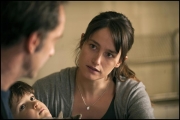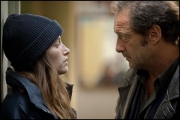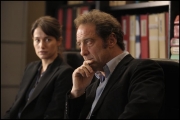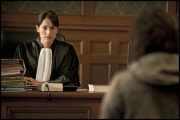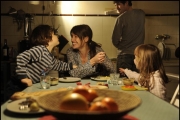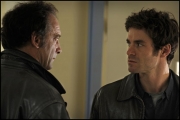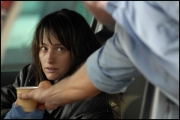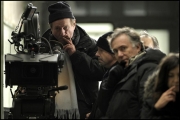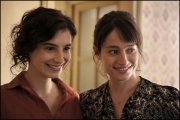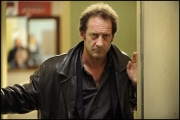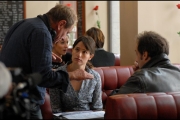Synopsis
All Our Desires is the story of an encounter between Claire, a young magistrate at the law court in Lyon, and Stéphane, an experienced, disillusioned magistrate whom she involves in her fight against insolvency. A fusion of revolt and emotions unites them, and above all the urgent need to live life to the full.
Cast & Crew
Director : Philippe Lioret
Screenwriter : Philippe Lioret and Emmanuel Courcol
Starring : Vincent Lindon, Marie Gillain, Amandine Dewasmes, Yannick Rénier
Schedule & Presentation
![]() Presentation by and discussion with director Philippe Lioret
Presentation by and discussion with director Philippe Lioret
Sunday, April 1 – 2:15 p.m at the Byrd Theater ~ ![]() 2h00 ~ General Audience
2h00 ~ General Audience
More informations
Choose a picture to see the filmography (source : IMDB)
![]()
What was the starting point of All Our Desires?
When I read Emmanuel Carrère’s book Lives Other Than My Own, I found it overwhelming and heartrending. Since I knew Emmanuel, I called him to tell him how it had moved me and to discuss a possible movie adaptation. We agreed that it would be impossible, first because the success of the book was due more to the author’s comments and aphorisms than the story itself. And more importantly because Emmanuel’s book was autobiographical, so portraying his close relatives was out of the question. So we left it there and time went by. I forgot about the book but the subject stuck to my head. A few months later, after Welcome came out, I came up with the idea of using it freely as source material instead of adapting it. Within a few days, the story I wanted to tell came together: the encounter between the two protagonists, their “investigation” to rescue Celine and thwart credit companies’ unethical practices, and the very special romance that develops between the two in the face of Claire’s impending death. I then called up Emmanuel Carrère to tell him about it and allowed me this “betrayal” of his book. Then I wrote the script with my co-screenwriter in six months’ time without ever going back to the book.
Why did you want to make this movie then?
I guess I wanted to explore times when people are out of their depth, when everything goes chaotic and people truly reveal themselves. What are you willing to do and how far are you willing to go when an extreme situation unexpectedly pops up? Faced with a particular context, people reconsider their priorities, develop relationships that no one could have envisioned – and often, they transcend themselves.
What “desires” are you talking about?
One day, I read this cynical offer on a flyer promoting consumer credit: “Indulge your every desire”. Those desires obviously alluded to all that money could buy, but as far Stéphane and Claire went, I liked the double entendre of the word. I love the words “desire” and “urge” because there is a driving force to them. It opens up all sorts of avenues and sometimes it even redefines our lives.
The film also exposes the excesses of consumer credit…
I imagine the day they came up with that thing… One day, I guess, a bunch of worried bankers held a meeting to talk about the stagnation of their profits because of stringent credit regulation resulting in loss of earnings. And then at the far end of the table one of them suddenly said: “Hey, there is no credit regulation for small loans… How about setting up subsidiaries allowing people to borrow small amounts of money several times… at a high interest rate obviously?” These days, ads are sent either by mail or via the Internet by consumer credit companies to lure thousands of low-income people into the trap of easy money. As they are tempted by a buying spree – which we are all itching for – and those dubious offers, the most vulnerable of them often get caught in a downward spiral of insolvency and quickly default on their payments. We have to keep in mind that the percentage of default does not exceed 3% (which still accounts for 8 million people in France alone) and that it is well compensated for by the outrageous interest rates that these credit companies impose on the debtors. And yet those firms cannot take the chance to let those defaulters go unpunished because it would encourage others to follow suit. Therefore, for those very people – unemployed people for the most part – bringing credit companies to justice is a tall order and these people end up in terrible predicaments. Unless a magistrate is bold enough to interfere and finds a way to suppress the David-and-Goliath law and the perverse mechanism allowing banks to get richer and richer. That is the struggle I was interested in when reading Emmanuel’s book.
Could you elaborate on the relationship between Claire and Stéphane? Is it love?
The intimacy that grows between them has not often been portrayed in films. And yet it may occur any day and it may follow an encounter you make in the workplace. Based on mutual understanding, it often turns into something more of a peculiar love-friendship relationship. Their relationship is a mix of professional camaraderie and romance based on the attraction for the father-like figure, and desire too. It is a story about the several facets of love. Even if their relationship is unambiguous, others view it differently. And the audience probably will too as they will relate to this encounter and to the issues it raises.
What was your approach to the movie?
I love cinema, I love telling a story, and I need to relate to that story. So it has to be absolutely realistic as I want the audience to forget that it is fiction. But then again, the construction of the screenplay must be gripping enough so that the narrative does the trick and keeps the audience riveted – which is what a script is all about. On the set, my main concern, once again, is that everything remains seamless. I do not want the dialogue to sound too “written”, I do not want the camerawork, or the production design, or the acting – naturally – to appear contrived… All I want is to make the audience feel that “they are part of it” and make them fully empathize with the characters – because emotions are key. That is also why I have such a hard time talking about my films and explaining the whys and the wherefores. If you do so, you end up sounding pompous. Which is precisely what I try to avoid when I make my films.
This is the second time you have directed Vincent Lindon, correct?
Working with him on Welcome was a unique experience, more than with any other actor. He is very dedicated, attentive, he is very friendly and he relies on intuition. We were very quickly on the same page, particularly regarding the very fabric of the character. We were both instinctively aiming at the same result. Our camaraderie helped me push the limits even more than I usually do, and it all made for sound relationships and a long-standing friendship. When he is in front of the camera, I like his charisma and the animal inside him. So naturally, once Welcome wrapped, we reached the unspoken agreement that we would do another film together.
What about Marie Gillain?
I was not looking for an actress – I was looking for Claire. I met a large number of actresses who could have portrayed her – some of whom were very convincing – but I could not help feeling that they did not fully capture the very essence of the character. I had not thought of Marie yet, but she insisted on doing a reading for me, during which I realized how determined she was – and I liked it very much. But she still had to “let go” a bit to play Claire. So she came back to do some screen tests. And then, as I gave her the line, I felt that she was not only dedicated but that she harbored the vulnerability and grace I had been looking for. She was Claire. Not only is Marie an amazing actress, but she is also a beautiful soul, full of delicacy and wit. She has brought a lot to the film and I have grown very close to her.
After Don’t Worry, I am Fine and Welcome, where do you stand with All Our Desires?
It was the first time that I entirely produced one of my films, so it was something new. However, thanks to the ongoing support of my accomplices, I never felt like it was an extra burden. Otherwise I am not sure… I guess it was the obvious continuation. All Our Desires is about determination, commitment and love… I realized that all my films implicitly address the same topic – the power of an encounter which helps us transcend ourselves. This film features people uniting against the absurdity of the world and shaking things up with a sense of urgency. That is what I am interested in.
What led you to star in All Our Desires?
Philippe sent me the screenplay. As soon as I finished reading it, I left a message on his answering machine: your story moved me deeply, I want to play Stéphane. You see, it was as simple as that. What I love about the script is that it has force, violence and infinite tenderness. And what I love about Philippe is that he tackles social issues by speaking to the heart rather than the head. And when the heart is touched, it rushes in.
What about this story moved you?
Everything. For example, the heroic and chivalrous way Stéphane makes Claire believe that she has found the legal solution to their battle while he was the one to give her the key. To me, his gift portrays generosity and an incredible beauty.
How did you prepare for your character Stéphane?
Stéphane, in a certain sense, is a little like Robin Hood. But usually, after having read and re-read a screenplay, I do not reflect too much on the psychology of the character. I dive in instinctively. To sound true, I also set out to be one with the character; I think about the way I should move, the way I should dress…
Is there a link between Stéphane and Simon, your character in Welcome?
It is still the story of someone who does something for somebody else, in some way or another. Both stories tell of the redemption of a man embittered by the shock of an encounter. Stéphane’s commitment had diminished with time but thanks to Claire, he starts having faith in life again. He is not Simon though. To put myself in the shoes of a judge who rediscovers his calling and puts himself back in the action rather giving up, I have obviously stepped out of Simon’s somewhat lost character in Welcome.
Is this also a way to get involved?
All Our Desires can make a change in terms of insolvency. Just as Welcome did with immigrants, this film might leave the Entertainment pages to land in the Politics pages. Therefore, I can tell myself that I did not make a pointless movie, and I love that.
How did this new project with Philippe Lioret go?
It was a long shooting – eleven weeks. But Philippe and I now know each other well so everything went just fine. He is very demanding, but also very understanding. I believe everybody already knows that. What they probably do not know is that he has another incredible quality: he is a guy who gives a lot of people a shot. And that is very rare in the film industry.
How did you end up in the cast of All Our Desires?
Philippe had not thought of me at first. It was even a bit of a battle to win the part. I had been totally consumed by Emmanuel Carrère’s book Lives Other than Mine. Even before reading the script, I had a deep personal conviction that this story was about me. And so I swallowed my pride and insisted. I landed a reading, then an audition. I braced myself and I gave it all I had. When Philippe picked me, he told me: “Thanks for not giving up on Claire. Claire does not give up on anything either”.
What appealed to you in the script?
It hits me. It deeply affected me. Philippe has such a poignant perspective on this woman who is my age. His writing is beautiful, lucid, modest, and right! When you are in your thirties and read the story of this young judge who just started her life and who will pass away in a few months leaving behind the man she loves, their children, this other man she just met and her love for her career, you relate to it. It is clearly a calling.
Is this film a tipping point in your career?
I obviously could not miss this role. Some people still think of me as a rosebud they vaguely remember… I was stuck with this label. Yet I am thirty years old. For an actress, the moment where she finally grows to play a real woman’s part is decisive. Besides, such roles are thin on the ground… It was therefore crucial to find the right script and the right director, the one who was going to trust me with the intimacies of a mature character.
How did you prepare for the character of Claire?
To prepare myself before the filming, I strolled around the district courts. I followed judges in their daily activities and met people who went through stages of humiliation and unbearable despair coming to court incredibly anxious and fragile. The judges explained to me that they try to listen to them and put themselves in their shoes, with empathy. That word got stuck in my head. Claire does everything she can to leave something valuable behind, something that could benefit the ones she loves. Her furious energy and determination to make a change are stronger than anything, almost stronger than life itself. And so I thought of this little phrase my mother told me when I was a kid and wanted to quit ballet. I loved it, but it was too demanding. She gave me a card with a star dancer on it, on which she wrote, “Those who don’t want to do anything find an excuse, and those who want to do something find a way.” It is a silly phrase but when you repeat it regularly, it gives you real motivation. And that, Claire is full of.
Do you relate to her battle?
Of course. Claire is one of those judges who prevent people from being taken advantage of, because it does happen. But above all, it is a movie about what we do with our lives. Everybody can identify with her personal struggle since death concerns us all. What do you do with your life when you know that the end is near? Claire refuses to break down. She does her best with what she has to move forward and to give to others. You leave this film with this urge to tell your loved ones… that you love them. But this sudden urge just to love is a lifelong job.
How was it like to work with Philippe Lioret?
A character like Claire requires an extreme precision at all times. Why this expression and not another? Why this silence, this smile? It is a huge task, led by Philippe upstream and then together during the filming. I would sometimes find Claire to be a bit difficult with her kids. We talked about it. What is truly great about filming with Philippe is his ability to listen and question. He told me why and I understood, but then he also wrote this magnificent scene where Claire is unsettled by her daughter’s question, “Will we go to Africa one day, Mom?”



